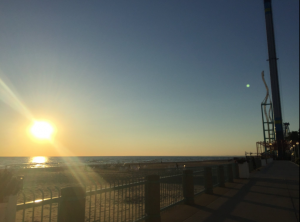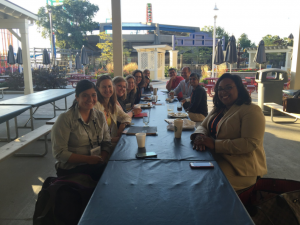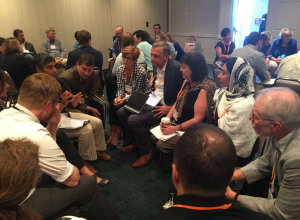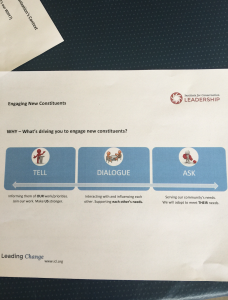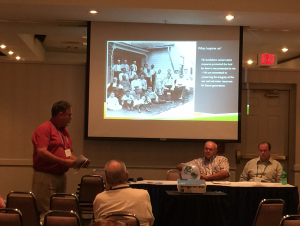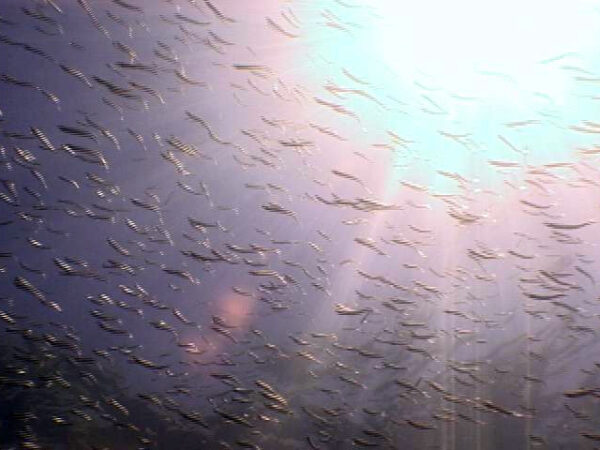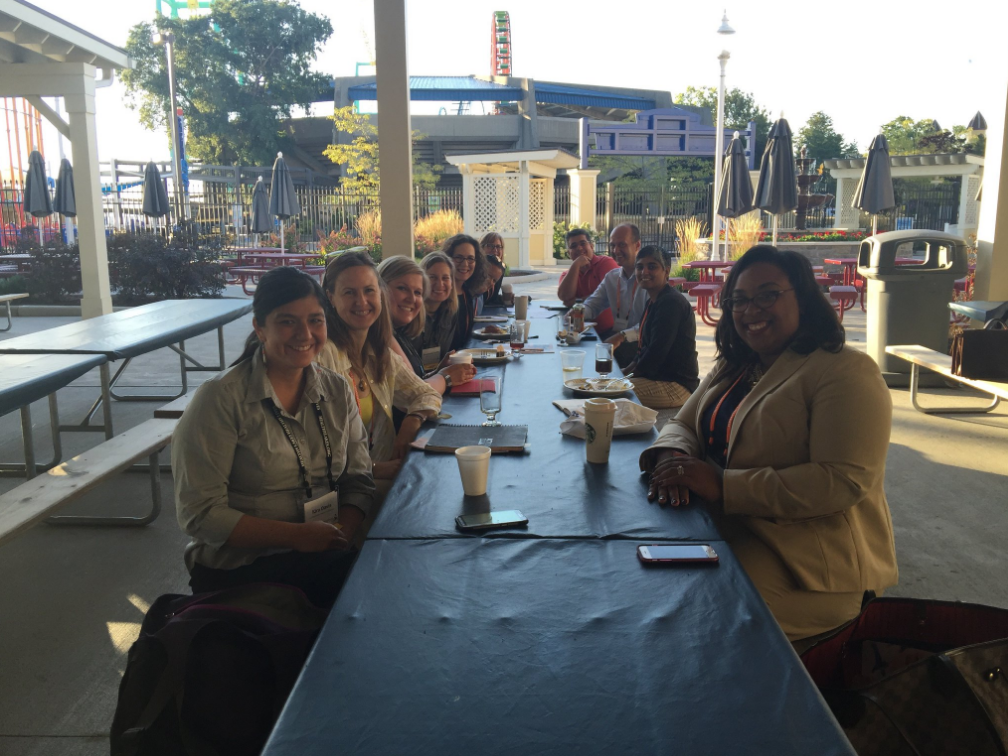
(Sandusky, Ohio)
Another beautiful sunrise greeted the participants of The 12th annual Great Lakes Restoration conference this morning at The Hotel Breakers Conference Center on Lake Erie. The morning began with an “Issue Tables Breakfast”, where we sat at tables labeled with discussion themes. The most crowded table was the equity and diversity table – which seemed natural given the energy around this topic in yesterday’s programming. The conversation reinforced a number of the ideas that arose yesterday; namely the importance of authenticity in relationships between communities, and a commitment to listening to the needs of those communities before prescribing solutions. We also got into the nitty gritty of how to recruit and retain diverse members for organizational boards.
The day was full of breakout sessions. It was hard to choose from the 3 rich themes being presented at once. The first session we attended was titled: Flint, Living with Contaminated Water/Toledo, Two Years Later and was moderated by Simone Lightfoot, Director of Urban Initiatives, National Wildlife Federation. The panelists were Mike Harris of The Flint Development Group and E. Michelle Mickens, CEO of Live 4 Change, LLC. The panelists spoke to the day to day experience of everyday citizens in urban environments dealing with the reality of contaminated water. Both panelists spoke from their perspective as both community leaders and residents, dealing with the issue on a personal, visceral level.
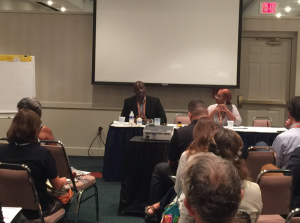
“Nothing has changed. Don’t believe what you’ve heard” Mike Harris on the situation in Flint, Michigan.
Next we checked in on a panel titled Algae Blooms: Collectively Creating Space for Solutions. In this session, Tony Maas, Strategies Manager of Freshwater Future presented a series of discussion questions to groups lead by representatives from of representatives of organizations across jurisdictions; Crystal Davis, Policy Director, Alliance for the Great Lakes, Raj Gill, Great Lakes Organizer, Canadian Freshwater Alliance, Ashley Wallis, Manager, Water Program, Environmental Defence Canada, Nancy Goucher, Manager, Partnerships, Freshwater Future, Jack Schmitt, Deputy Director, Michigan League of Conservation Voters, Gail Hesse, Great Lakes Water Program Director, National Wildlife Federation, Kristy Meyer, Managing Director, Natural Resources, Ohio Environmental Council. 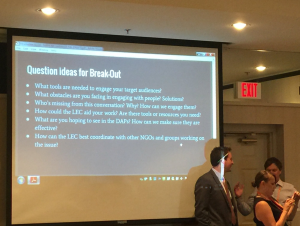 “What tools are needed to engage your target audience? What obstacles are facing in engaging with people? Solutions? Who’s missing from the conversation? Why? How can we engage them?” These are questions that resonate with what has been emerging as an overall theme for this years conference: the science and the policy work is getting done, and well, but how do we energize engagement around what we are learning? How do we speak, even amongst ourselves, more openly and fluidly?
“What tools are needed to engage your target audience? What obstacles are facing in engaging with people? Solutions? Who’s missing from the conversation? Why? How can we engage them?” These are questions that resonate with what has been emerging as an overall theme for this years conference: the science and the policy work is getting done, and well, but how do we energize engagement around what we are learning? How do we speak, even amongst ourselves, more openly and fluidly?
Next up, and part of the increasingly rich, nuanced conversation on authenticity, inclusion and equity was a panel titled A Changing Landscape: Engaging New Constituencies. Lead by Diane Russell, President, and Cheryl Glasser, Senior Associate at the Institute for Conservation Leadership. This session was devoted to the “why” behind organizations need for engagement on the “how” of engaging new constituencies.
Ms. Russell once again emphasized the importance of listening to the needs and unique perspective of the constituencies being approached, as well as an honest self assessment of one’s own biases, tendencies, and cultural habits and/or assumptions.
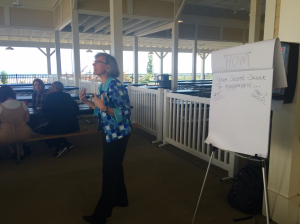
Diane Russell, President, Institute for Conservation Leadership. “What is your secret sauce for engagement?”
The lunch session was titled Back to the Future: Mustering Science and Political Will to Save Lake Erie, Again. Esteemed panelists included Lana Pollack, Chair, U.S. Section, International Joint Commission, Anita Rios, Toledo Resident, Frank Szollosi, Great Lakes Regional Outreach Campaigns Manager, National Wildlife Federation, Jeffrey M. Reutter, Special Advisor, Ohio Sea Grant College Program and Franz Theodore Stone Laboratory,Verna Harrison, Verna Harrison Associates, LLC. The conversation explored both the promise and the pitfalls in the collective battle against algal blooms. You can view the entire session by clicking here.
From there we joined the breakout session titled The Mackinac Straits Oil Pipeline: Prospects and Implications. The panel was moderated by Mike Shriberg, Great Lakes Regional Executive Director, National Wildlife Federation. Panelists included Rich Bergman, Owner, Lake Charlevoix Brewing Company, Liz Kirkwood, Executive Director, For the Love of Water, Jim Lively, Program Director, Groundwork Center for Resilient Communities and Jennifer McKay, Policy Director, Tip of the Mitt Watershed Council. All of the speakers spoke to the potential devastation posed by the pipeline, and the need for more government action to protect the Great Lakes for the sake of public interest.
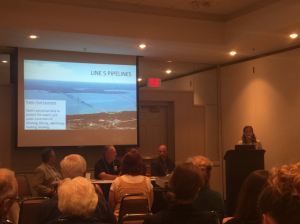
“This is the public trust issue of our times” Liz Kirkwood on state’s duty to protect the water in the Mackinac Straits.
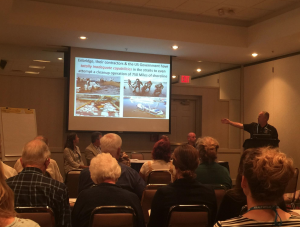
“we don’t have the necessary equipment in our state do deal with this kind of a spill” Rich Bergman on Mackinac Straits Line 5 oil pipeline.
The last panel of the day we attended was titled Farmers Engaging Farmers to Protect Water Quality. This panel was moderated by Amy Gilhouse of the Michigan Agricultural Environmental Assurance Program Technician, Lenawee Conservation District. In this conversation, Jim Isley, a farmer from Lenawee County, Michigan and Wayne Dinius and his son, both farmers from Fulton County, Ohio, spoke passionately about their dedication to environmentally conscious methods of farming as a way of honoring their past, and protecting their future. They shared methods and techniques for soil and water conservation that they’ve had success with. Leading by example, these farmers suggested tools for and methods of communications with agricultural producers. The agricultural community is one of the diverse groups that require the asking, deep listening, and authentic relationship building that has been identified by so many at this conference as necessary for true engagement in the collective effort to protect and sustain the health of the Great Lakes.
We conducted a number of interviews throughout the day with Great Lakes luminaries that we will be sharing here next week. Stay tuned for those videos, and a review of the presidential candidate surrogate presentations tomorrow.


